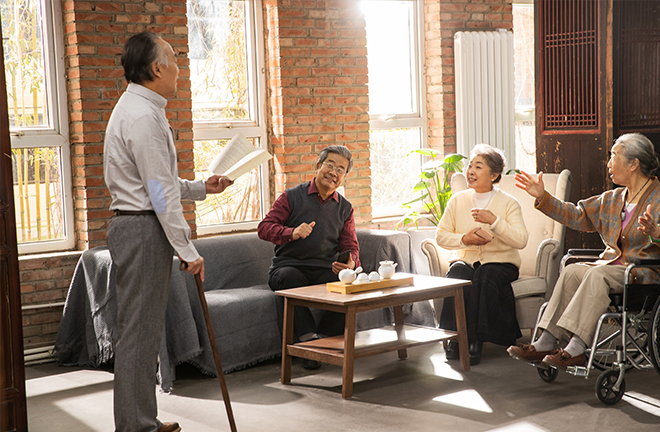Improving the cultural-ethical life of community residents

Community residents gather to read and chat. Photo: TUCHONG
A high quality cultural-ethical life is an integral part of a happy and fulfilling life. However, contemporary society is complex, ever-changing and brimming with uncertainty, weakening people’s sense of orientation and meaning in everyday life and breeding indifference in interpersonal relationships. Community governance should therefore place emphasis on improving the cultural-ethical life of community residents.
Main structure
The cultural-ethical life of community residents consists of three key dimensions: everyday knowledge, emotional experience, and value beliefs. Everyday knowledge refers to the practical experience or information that ordinary people must master to meet basic needs such as food, clothing, housing, and health care. An effective system of everyday knowledge allows for improving residents’ cognitive and practical skills and making life more predictable and manageable.
Emotional experience is built upon understanding and empathy between individuals. In traditional acquaintance societies, people’s emotional needs are relatively well satisfied. Community members support one another in daily life, forming mutual trust and emotional attachment.
Value beliefs, as a collective awareness shared by community residents, are embodied by their recognition and pursuit of meaningful things in life. Value beliefs can motivate residents and guide their actions, making everyday life more meaningful.
Increasing uncertainty
Urbanization, marketization, and technicalization have profoundly influenced social life. The supporting and guiding role of traditional cultural life is gradually declining, resulting in increased uncertainty in people’s cultural-ethical lives.
Firstly, there is an increase in the uncertainty of everyday knowledge. As contemporary community residents entrust most of their daily affairs to professionals through purchased services, everyday knowledge in community life is largely introduced by experts or practitioners. This could give rise to information asymmetry between experts and ordinary residents, making it difficult to manage daily life.
In modern society, people encounter myriad complicated problems in their daily lives. This necessitates the acquisition of an unprecedented amount of experience and information to tackle these problems, and a single system of everyday knowledge is no longer universally applicable across generations.
Secondly, the uncertainty of social relationships diminishes emotional experience. Interpersonal relationships in modern society are primarily based on rational contractual relationships, while stable, intimate relationships within communities have become scarce. Building trust among community members is challenging, and the objects of emotional attachment are uncertain.
Many people try to seek emotional comfort in consumption. However, the emotional connection between humans and objects is unable to replace the emotional connection between individuals. Humans are social creatures whose self-identities develop when they are respected, recognized, and accepted by others. Without understanding and empathy among individuals, a sense of loneliness and meaninglessness will permeate their cultural-ethical life.
Thirdly, the uncertainty of value beliefs is increasing. Morality, ethics, and ideals are formed through collective advocacy and affirmation, and internalized by society members. The experience of social roles is concrete and rich in collective life. Role models and encouragement from within a community provide its members with guides to action and fill them with a sense of mission. In modern society, this experience becomes abstract, weakening individuals’ motivation and sense of achievement in daily actions.
Enhancing quality
Improving the cultural-ethical life of community residents requires efforts to be made in the following aspects. First, a shared system of everyday knowledge should be built. Practical and relevant everyday knowledge helps improve residents’ understanding of their living environments, enabling them to act on a scientific and reasonable basis in daily life. Technical or policy knowledge pertaining to issues concerning people’s wellbeing can be disseminated through community education, thereby facilitating information equality and knowledge sharing. Advanced information technology can be utilized to create platforms for sharing everyday knowledge, helping residents internalize the knowledge in an engaging manner.
Second, it is important to facilitate interaction among community residents. This requires attracting their daily activities to community space to mitigate the effects of fragmented community life. Community workers need to encourage residents to engage in community affairs in order to enhance mutual trust and recognition while sharing public responsibilities. They should also support residents in the establishment of community organizations to form stable social relationships.
Third, new value beliefs should be introduced into community life. Family ethics can benefit from traditional Chinese culture. Community workers should work together with residents to create a quality living environment and enhance their sense of identity and belonging. It is advisable to advocate for public spirit and guide residents’ participation in volunteer activities, as individuals can enrich their understanding of the meaning and value of life when helping vulnerable groups within or outside their own community.
Yu Yanshen (lecturer) and Xu Kaiyun (associate professor) are from Lingnan Normal University.
Edited by WANG YOURAN
